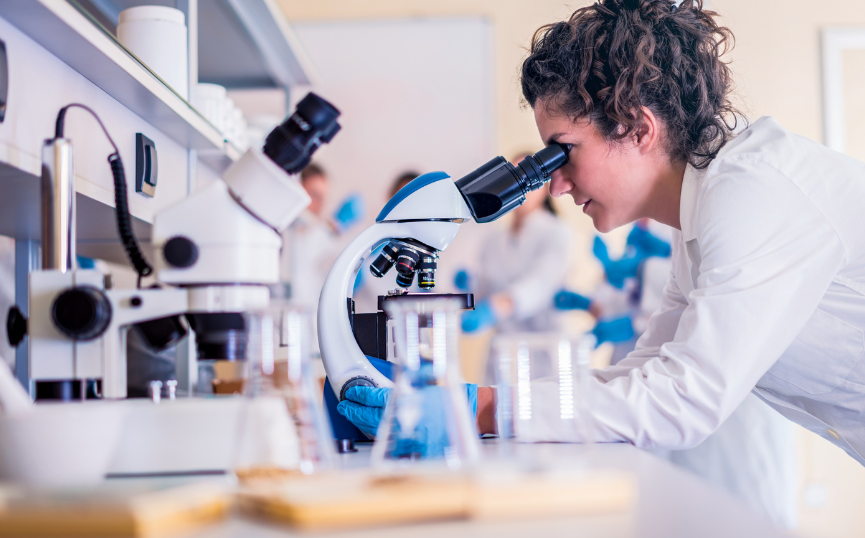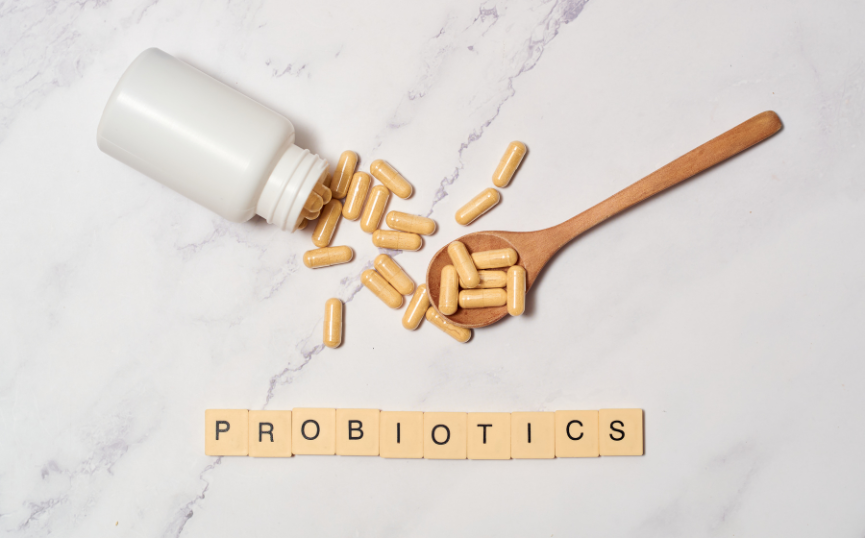How does microbiome affect your immune system?
The microorganisms in our gut are simply super healthy and looking after them is essential for our immune system. The impact of gut flora on the immune system is widely understood and accepted, but this has not always been the case. Studies linking the immune system and the microbiome began to grow exponentially in the 2000s.

Now, you may ask, how can these grand realisations help me?
In the first part of this article, we'll go into more detail about these studies, and in the second half of the article we'll look at some of the lesser-known benefits and drawbacks of probiotics. We will also show you what you should look out for before buying probiotics.
Gut flora or gut microbiota?
The two words are colloquially used to mean the same thing, but the term "flora" refers to plants and is now obsolete in technical texts. In colloquial language, however, "flora" is still widely used. You will come across both terms while reading this article, but you already know the difference.
So, both gut microbiome and gut flora refer to organisms (mostly bacteria, but they can also be viruses and fungi) that are beneficial to the host. Yes, you got it right, they can be both fungi and viruses!
Bacteria (as part of the gut microbiota) perform many functions. Several of them include:
- They ferment indigestible fibre for our stomachs, producing vitamins K and B, and they produce proprionates that are absorbed by the liver, butyrates that nourish intestinal epithelial cells and acetates that supply muscle tissue. These last 3 molecules are short-chain fatty acids. So bacteria can produce fatty acids with very different chemical structures from very complex carbohydrates (i.e. fibres).
- In addition to fibre, they also break down bile acids, sterols and certain foreign substances.
- They play an important role in the proper functioning of the immune system.
- A growing number of studies support the gut-brain barrier hypothesis that the gut microbiome can affect brain function.14
Viruses living in the intestinal tract are collectively known as vira. Virome is also part of the gut microbiome and includes beneficial bacteria such as:
- Bacteriophages: these viruses infect bacteria and can help regulate the composition of gut bacteria. They can help to balance the ratio of 'good' and 'bad' bacteria.
- Some viruses stimulate the immune response in a controlled way without causing disease. In other words, these viruses "train the immune system".
Fungi living in the gut are broadly described by the word mycobiota. Mycobiota fungi include useful species such as:
- Saccharomyces boulardii: A probiotic yeast, a healer of diarrhea and intestinal problems. Helps protect the intestinal wall and restore healthy gut bacteria.
- Certain Candida species: Although Candida overgrowth can cause problems, certain Candida strains play a small role in nutrient metabolism - meaning they can be part of normal gut flora.
So, like everything: our gut is all about balance! These little facts confirm Paracelsus' famous saying that "dose makes the poison".

Gut flora and immune system research in chronological order
The first scientific evidence confirming that the gut flora and the immune system are linked began to appear in the mid-20th century. Advances in microbiology and immunology allowed for a more detailed study of microorganisms in the gut and the immune response. Here are some important milestones!
1. Studies in germ-free mice1,2
The first breakthrough was animal research with sterile gut flora. Researchers created these so-called germ-free mice by rearing them in a sterile environment from birth. These animals, which had not been exposed to any microbial contact, had an underdeveloped immune system, with particularly low levels of lymphatic tissue in their intestines. When these mice were exposed to normal intestinal flora, their immune systems recovered.
2. Direct effects of gut microbes on the immune system3
The next step was research in the 1970s. It was shown that as gut microbes break down fibre, they produce short-chain fatty acids that can activate immune cells. These results confirmed that the gut flora is actively involved in regulating the immune response.
3. Discovery of Lipopolysaccharides (LPS) and Toll-like Receptors (TLRs)4
In the 1990s, "components" (such as lipopolysaccharides) were discovered on bacteria in the gut microbiome that interact with the host immune system. The Toll-like receptors (TLRs) of immune cells play a key role in this process. Thus, the Toll-like receptors of immune cells come into contact with lipopolysaccharides expressed by the bacteria. This mechanism plays a key role in the communication between the gut flora and the immune system.
4. Probiotics and the immune response5
Research in the 1990s and 2000s demonstrated that certain probiotic strains of bacteria (e.g. Lactobacillus and Bifidobacterium species) can enhance the immune response, such as boosting mucosal immunity and cytokine production. Subsequently, probiotic supplements have been at the forefront of the market. A little extra: probiotic Danone yoghurt has been on the market since 1919 and was first made with the first identified probiotic Lactobacillus bulgaricus.
5. Discovering molecular mechanisms6
With advances in genetics in the early 2000s, it was shown that substances produced by gut microbes, such as butyrate and propionate, influence inflammatory processes and immune balance (homeostasis). A lack of or imbalance in the gut flora (dysbiosis) can contribute to the development of inflammatory diseases such as Crohn's disease, allergies and autoimmune disorders.
6. Childhood microbial exposure and allergies7
Epidemiological studies have shown that low microbial exposure in childhood (e.g. excessive hygiene) is associated with an increased incidence of allergic and autoimmune diseases. So it was not for nothing that our grandparents said "we should eat a kilo of dirt a year".
7. Interaction of Immune Cells and Microbes8
Research over the last decades, such as the exploration of the role of IL-10-producing T-regulatory cells (Treg), has shown that the gut flora actively contributes to the tolerance of the immune system. Immune tolerance is key in the prevention of autoimmune diseases.
So the evidence is strong and almost irrefutable. Now, many people may think that they need to rush out and buy a probiotic immediately to "make sure the immune system is in order". But probiotic supplementation is not nearly as clear-cut as the studies linking the gut microbiome and the immune system.

The "bright side" of probiotics13
Another very important feature of the gut flora is the so-called "barrier function", i.e. the right "beneficial" bacterial composition of the gut microbiome and other flora (such as the vaginal flora) to help prevent pests from taking hold. In this way they also have a direct protective function against pathogens.
Probiotic supplementation is of key importance in the case of impaired flora. The flora can break down for a number of reasons: the most powerful is the use of antibiotics, but a diet low in fibre can also negatively affect the gut microbiome. This article is not in a position to argue the case for antibiotics, as in some cases a course of high doses of antibiotics can be life-saving.
Other factors that can deteriorate the gut flora19:
- Poor eating habits
- Excessive sugar intake - Refined sugars and processed foods promote the overgrowth of harmful bacteria and fungi such as Candida.
- Low fibre intake - Fibres (e.g. prebiotics) feed beneficial bacteria, and if they are deficient, they will simply not get enough nutrients. Therefore, without fibre, the gut microbiome will deteriorate.
- High fat and protein diets without fibre - Eating too much processed meat and trans fats can trigger inflammatory processes in the gut that can lead to a deterioration of the gut flora.
- Preservatives and artificial additives - Some food additives (e.g. emulsifiers) can damage the balance of gut flora. Additives that cause intestinal flora deterioration include: polysorbate-80 and carboxymethylcellulose, artificial sweeteners such as saccharin, sucralose and aspartame.15-18
- Antibiotics and other medicines
- Antibiotics - They kill not only pathogenic bacteria but also beneficial gut bacteria.
- Non-steroidal anti-inflammatory drugs (NSAIDs, e.g. ibuprofen)
- Antacids (proton pump inhibitors, e.g. omeprazole)
- Steroids and hormonal contraceptives
- Chronic stress and sleep deprivation
- Increase inflammatory processes and intestinal permeability (leaky gut syndrome).
- Environmental factors and lifestyle
- Excessive alcohol consumption - Deteriorates the integrity of the intestinal wall and promotes the proliferation of harmful bacteria.
- Smoking - Increases inflammation and damages the balance of gut flora.
- Sedentary lifestyle
- Environmental pollutants and chemicals - Heavy metals, pesticides and some food contaminants can damage gut flora.
- Infections and chronic diseases
- Viral and bacterial infections - Infections of the digestive tract (e.g. Clostridium difficile) can lead to permanent damage to the gut flora.
- IBS, IBD (Crohn's disease, ulcerative colitis) - These diseases are often accompanied by a deterioration in the gut flora.
- Diabetes and metabolic syndrome - Fluctuating blood sugar levels and insulin resistance affect gut bacterial composition. Think of how excessive sugar intake also degrades gut flora - blood sugar fluctuations have a similar effect.
The "downside" of probiotics9-12
Certain probiotic preparations may contain "strains of bacteria carrying transferable antibiotic resistance". Normally, the genes responsible for antibiotic resistance are not a problem, but if these genes are mobile (e.g. located on plasmids), they can be transferred to pathogens, promoting the spread of antibiotic resistance.
For example: certain strains of Lactobacillus may show transferable resistance to certain antibiotics and thus contribute to the spread of antibiotic resistance.
For reliable probiotics, it is important that the bacterial strains they contain do not carry antibiotic resistance genes that can be transferred to other bacteria. Trusted manufacturers and research laboratories carry out the following tests to ensure this:
- determine which antibiotics the probiotic bacteria are sensitive or resistant to.
- they test whether resistance genes are stable or mobile (found on plasmids or transposons).
- finally, they check that the probiotic bacteria do not carry toxin-producing or pathogenic properties.
What probiotics are tested in this way?
- Medicinal-grade probiotics: these are developed specifically for medical purposes and often undergo clinical trials (e.g. VSL#3, Vivomixx).
- European Food Safety Authority (EFSA) approved strains: EFSA only approves strains that do not carry transferable antibiotic resistance genes.
- Probiotics tested in academic and clinical trials: For example, some strains of Lactobacillus and Bifidobacterium undergo specific resistance testing.
Food for thought
Now Foods Probiotic-10 25 Billion, Probiotic contains clinically proven strains, so there is a low chance they may carry transferable antibiotic resistance. So our basic probiotic recommendation would fall on this product.
It would also be important to support probiotic supplementation with prebiotics. Prebiotics are in fact fibres, which are what the bacteria feed on. So it is not only necessary to supplement them, but it is also particularly important to supplement the nutrients they need to survive. Now Foods Prebiotic Bifido Boost™ - Prebiotic Powder is the perfect choice for supplementing prebiotic fibre.
- Lubin JB, Green J, Maddux S, Denu L, Duranova T, Lanza M, Wynosky-Dolfi M, Flores JN, Grimes LP, Brodsky IE, Planet PJ, Silverman MA. Arresting microbiome development limits immune system maturation and resistance to infection in mice. Cell Host Microbe. 2023 Apr 12;31(4):554-570.e7. doi: 10.1016/j.chom.2023.03.006. Epub 2023 Mar 29. PMID: 36996818; PMCID: PMC10935632.
- https://ojs.mtak.hu/index.php/egfejl/article/view/6928
- Burger S, Stenger T, Pierson M, Sridhar A, Huggins MA, Kucaba TA, Griffith TS, Hamilton SE, Schuldt NJ. Natural Microbial Exposure from the Earliest Natural Time Point Enhances Immune Development by Expanding Immune Cell Progenitors and Mature Immune Cells. J Immunol. 2023 Jun 1;210(11):1740-1751. doi: 10.4049/jimmunol.2300061. PMID: 37074206; PMCID: PMC10192123.
- Akira S, Uematsu S, Takeuchi O. Pathogen recognition and innate immunity. Cell. 2006 Feb 24;124(4):783-801. doi: 10.1016/j.cell.2006.02.015. PMID: 16497588.
- Cebra JJ. Influences of microbiota on intestinal immune system development. Am J Clin Nutr. 1999 May;69(5):1046S-1051S. doi: 10.1093/ajcn/69.5.1046s. PMID: 10232647.
- Abt MC, Osborne LC, Monticelli LA, Doering TA, Alenghat T, Sonnenberg GF, Paley MA, Antenus M, Williams KL, Erikson J, Wherry EJ, Artis D. Commensal bacteria calibrate the activation threshold of innate antiviral immunity. Immunity. 2012 Jul 27;37(1):158-70. doi: 10.1016/j.immuni.2012.04.011. Epub 2012 Jun 14. PMID: 22705104; PMCID: PMC3679670.
- Colina M, Govoni M, De Leonardis F, Trotta F. La iperostosi scheletrica idiopatica diffusa (D.I.S.H.) [Diffuse idiopathic skeletal hyperostosis (D.I.S.H.)]. Reumatismo. 2006 Apr-Jun;58(2):104-11. Italian. doi: 10.4081/reumatismo.2006.104. PMID: 16829987.
- Dillon SM, Lee EJ, Kotter CV, Austin GL, Gianella S, Siewe B, Smith DM, Landay AL, McManus MC, Robertson CE, Frank DN, McCarter MD, Wilson CC. Gut dendritic cell activation links an altered colonic microbiome to mucosal and systemic T-cell activation in untreated HIV-1 infection. Mucosal Immunol. 2016 Jan;9(1):24-37. doi: 10.1038/mi.2015.33. Epub 2015 Apr 29. PMID: 25921339; PMCID: PMC4626441.
- Zavišić G, Popović M, Stojkov S, Medić D, Gusman V, Jovanović Lješković N, Jovanović Galović A. Antibiotic Resistance and Probiotics: Knowledge Gaps, Market Overview and Preliminary Screening. Antibiotics (Basel). 2023 Aug 3;12(8):1281. doi: 10.3390/antibiotics12081281. PMID: 37627701; PMCID: PMC10451169.
- https://www.frontiersin.org/journals/microbiology/articles/10.3389/fmicb.2017.00908/full
- Montassier, E., Valdés-Mas, R., Batard, E. et al. Probiotics impact the antibiotic resistance gene reservoir along the human GI tract in a person-specific and antibiotic-dependent manner. Nat Microbiol 6, 1043–1054 (2021). https://doi.org/10.1038/s41564-021-00920-0
- Ouwehand AC, Forssten S, Hibberd AA, Lyra A, Stahl B. Probiotic approach to prevent antibiotic resistance. Ann Med. 2016;48(4):246-55. doi: 10.3109/07853890.2016.1161232. Epub 2016 Mar 26. PMID: 27092975.
- Zheng Y, Zhang Z, Tang P, Wu Y, Zhang A, Li D, Wang CZ, Wan JY, Yao H, Yuan CS. Probiotics fortify intestinal barrier function: a systematic review and meta-analysis of randomized trials. Front Immunol. 2023 Apr 24;14:1143548. doi: 10.3389/fimmu.2023.1143548. PMID: 37168869; PMCID: PMC10165082.
- Carabotti M, Scirocco A, Maselli MA, Severi C. The gut-brain axis: interactions between enteric microbiota, central and enteric nervous systems. Ann Gastroenterol. 2015 Apr-Jun;28(2):203-209. PMID: 25830558; PMCID: PMC4367209.
- Suez J, Korem T, Zeevi D, Zilberman-Schapira G, Thaiss CA, Maza O, Israeli D, Zmora N, Gilad S, Weinberger A, Kuperman Y, Harmelin A, Kolodkin-Gal I, Shapiro H, Halpern Z, Segal E, Elinav E. Artificial sweeteners induce glucose intolerance by altering the gut microbiota. Nature. 2014 Oct 9;514(7521):181-6. doi: 10.1038/nature13793. Epub 2014 Sep 17. PMID: 25231862.
- Chassaing B, Koren O, Goodrich JK, Poole AC, Srinivasan S, Ley RE, Gewirtz AT. Dietary emulsifiers impact the mouse gut microbiota promoting colitis and metabolic syndrome. Nature. 2015 Mar 5;519(7541):92-6. doi: 10.1038/nature14232. Epub 2015 Feb 25. Erratum in: Nature. 2016 Aug 11;536(7615):238. doi: 10.1038/nature18000. PMID: 25731162; PMCID: PMC4910713.
- Méndez-García LA, Bueno-Hernández N, Cid-Soto MA, De León KL, Mendoza-Martínez VM, Espinosa-Flores AJ, Carrero-Aguirre M, Esquivel-Velázquez M, León-Hernández M, Viurcos-Sanabria R, Ruíz-Barranco A, Cota-Arce JM, Álvarez-Lee A, De León-Nava MA, Meléndez G, Escobedo G. Ten-Week Sucralose Consumption Induces Gut Dysbiosis and Altered Glucose and Insulin Levels in Healthy Young Adults. Microorganisms. 2022 Feb 14;10(2):434. doi: 10.3390/microorganisms10020434. PMID: 35208888; PMCID: PMC8880058.
- Finamor I, Pérez S, Bressan CA, Brenner CE, Rius-Pérez S, Brittes PC, Cheiran G, Rocha MI, da Veiga M, Sastre J, Pavanato MA. Chronic aspartame intake causes changes in the trans-sulphuration pathway, glutathione depletion and liver damage in mice. Redox Biol. 2017 Apr;11:701-707. doi: 10.1016/j.redox.2017.01.019. Epub 2017 Feb 1. PMID: 28187322; PMCID: PMC5300302.
- Wen L, Duffy A. Factors Influencing the Gut Microbiota, Inflammation, and Type 2 Diabetes. J Nutr. 2017 Jul;147(7):1468S-1475S. doi: 10.3945/jn.116.240754. Epub 2017 Jun 14. PMID: 28615382; PMCID: PMC5483960.


